.

Director/Screenwriter/Executive Producer/Star: Tommy Wiseau
By Roderick Heath
The Room has grown slowly but with ever-increasing momentum to become perhaps the preeminent Bad Movie of our time. When people talk about Bad Movies, the kind I mean by capitalising the epithet, they’re usually interested in the pleasures gained from the obscene mockery of all good sense exhibited on the screen. There’s affection in the way we love Bad Movies, akin to the impulse that makes people take in stray animals. Less noble emotions, too, including a level of wrath for the frustration that many of us aim at movies for being made by people richer and prettier and more talented than we are (or who at least mysteriously have access to enough money to make them) finds appropriate targets in select icons that encapsulate everything that can be rotten about cinema. These people become scapegoats, whipping boys, Gadarene swine for all the small frustrations and dashed hopes, the cumulative cognitive dissonance and offended sensibilities that movies can provoke and fuel. And yet, anyone who’s ever tried to create anything can empathise, usually distantly, but sometimes all too keenly, with the failures of artistic ambition that, a bit like the way decomposing marine life lends a phosphorescence to the brine, illuminate what’s actually good that much more clearly.

We rate movies according to the success with which they, in fact, lie to us. A film that so utterly compels us with its lies, say, The Godfather, Gone with the Wind, or any other movie hailed as a popular icon of great cinema, stands in contrast to Bad Movies, which are defined by their failure in this regard. The worse the movie, the more evident it usually is that the movie is constructed by a complex interplay of technicians and actors. Therein lies the beauty – or anti-beauty – of Ed Wood’s films, and this truth is also present in Tommy Wiseau’s 2003 debut film The Room, feeding into the playful audience participation that usually infuses such cult artefacts, as if, in failing to live up to any reasonable standard of professionalism, they have instead become open, interactive creations. Such works offer, in their way, unfiltered windows into their makers’ lives and attitudes, redolent of narcissism or at least breathtaking insensitivity to the problems of art. The cult status of The Room gathers more ironies in that the cult was germinated amongst the young culturati of California, essentially the same milieu from which the film itself emerged. Tommy Wiseau’s origins have been described as obscure, and, of course, Wiseau’s weird accent, bizarrely retro personal style, and strange notions about what a film should look and sound like readily designate him as a figure of fun.

Such considerations serve merely as intellectual prologue for me to the actual experience of watching The Room, which is, alternately, deliriously funny and deeply depressing. Armed with a budget that would have been entirely sufficient for other, actually talented filmmakers to put together something great, Wiseau produced one of the most god-awful films ever made. There’s often a peculiar kind of magic at work with bad films, as the piling up of mistakes and idiocies metastasize, and replicate, in their way, the same accumulation of refinement or invention that makes for great films; they therefore can be just as compelling, as each little fragment of foolishness takes on its own epic lustre. The Room certainly fulfils this requirement of the awe-inspiringly Bad Movie. I spent long stretches of the film clawing the air in pinioned physical reaction, and had to take a long breather in the middle, for it was starting to make me feel like a prisoner in a Kafkaesque nightmare. One by one, all of my more gentlemanly, inquisitive, broad-minded instincts were met and defeated by this film; it actively invites cheap shots at such rancid conceits as Wiseau’s evident pride in serving his body up as what he obviously thinks is a strapping example of manhood, but which in certain shots and lighting, looks rather like he’s suffered some sort of massive tissue trauma. Even the film’s title broadcasts a stultifying lack of imagination. What room does it refer to? The bedroom? The living room? The room in the loony bin waiting for anyone who watches this film without warning?

The Room is the story of Johnny (Wiseau), an all-round awesome dude with a fiancée— oh, sorry, “future wife” as she’s constantly referred to—Lisa (Juliette Danielle) who live together in a dream apartment in San Francisco. We know it’s San Francisco thanks to the endless opening montage of tourist brochure locations. And if we didn’t notice it then, Wiseau re-uses shots of the Golden Gate Bridge and other locales throughout The Room in his constant, ham-fisted scene interchanges. He even appears in some of them, crossing the frame with all the apparent randomness of CCTV footage or one of those “actual documented proof” movies depicting a Bigfoot sighting. Actually, with his long shaggy hair and knobbly, fit yet ungainly body, Wiseau looks a bit like Bigfoot, strategically shaved.
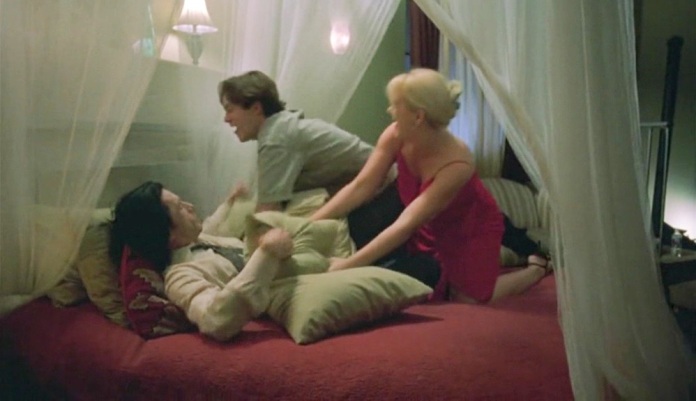
But I digress. Johnny is an employee with a bank who credits himself with saving his employers large sums of money, and expects a big promotion. Lisa talks about having to do something with computers, but she’s a failure at that, and so spends all day every day sitting about their apartment. Early on in The Room, Johnny comes home with a gift for Lisa, a sexy red dress she promptly dons as an overture to a scene of extended, sweaty passion, but only after a bit of banter with Denny (Philip Haldiman). He’s a young man whom Johnny apparently once wanted to adopt and whose college education Johnny is paying for, in spite of the fact that Denny acts like an emotionally retarded 11-year-old, following Lisa and Johnny up to their bedroom and hurling himself into their pillow fight, before they make it clear to him they want him to go away so they can make sexy-time.
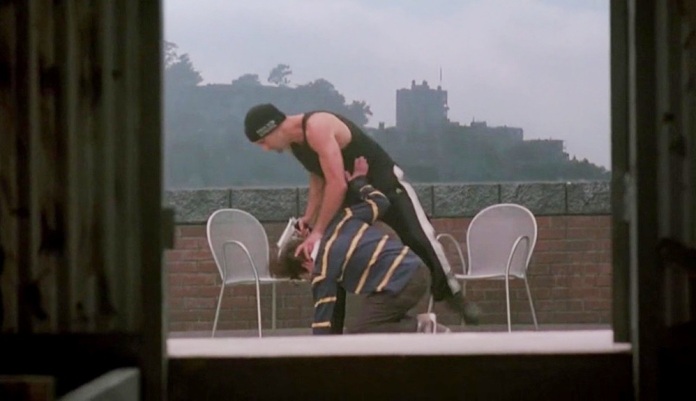
Later, there will be a dramatic moment in which Denny is threatened by a gun-wielding drug dealer who insists in an unreasonably forceful manner that he be paid for selling Denny some of his wares, but fortunately Johnny and Johnny’s best friend Mark (Greg Sestero) grab the thug and take his gun without great difficulty before bundling him away. After a few tearful recriminations, this incident is not mentioned again. Its purpose, we later learn, is simply to get a gun into the story. Mark is the object of Lisa’s lust, for Lisa, as she explains to her reprehending, patronising mother Claudette (Carolyn Minnott), is bored with Johnny in spite of the fact that, as everyone repeatedly states, he’s a being of overwhelming goodness. He is a river to his people: father-figure to Denny, breadwinner to Lisa, and his apartment is, as Claudette describes it, a bit like Grand Central Station for the people who traipse through it. Michelle and Mike (Robyn Paris and Mike Holmes), a couple who, in spite of being in what appears to be their mid-20s, feel a need to sneak into Johnny’s place under the cover of doing “homework” in order to erotically share chocolates. Michelle is also Lisa’s confidante and sometime-enabler of her wayward sociopathic streak, half-heartedly trying to talk her into being honest with Johnny, but mostly just giggling along as if they’re both high and having playful fights with household objects.
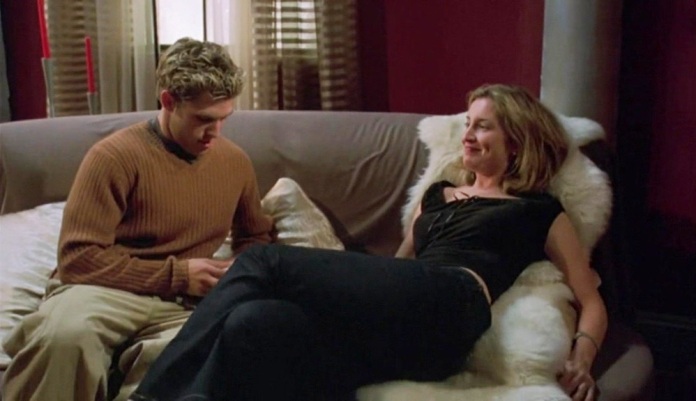
Other randomly introduced members of this circle of friends include Peter (Kyle Vogt), a psychologist who mumbles vague opinions about Lisa’s mindset, and some guy who looks a bit like Danny Huston who first appears during the climactic party scenes and yet seems instantly included as a major character. An aspect of The Room that attracts the most immediately obvious incredulity, and yet which I found myself particularly taken by, is the way it accidentally trashes the settled niceties of humdrum screenwriting. It’s as if Wiseau, in penning his script, began toying with many possible discursions for his tale, decided to pursue none except the central romantic crucifixion, and then did no rewriting whatsoever. Scenes lurch by and repeat without specific motion, the story has an entirely disconnected rhythm, and Wiseau doesn’t just introduce conflict, but every conflict he can think of.
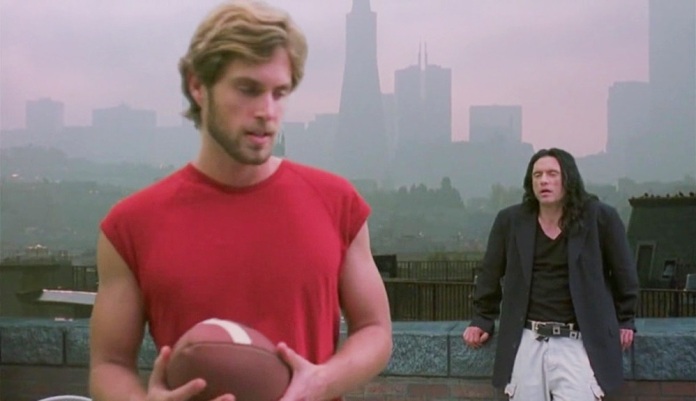
Johnny tries blatantly to make Denny his lovably foolish mascot, as he cajoles the guys into playing football when they’re wearing tuxedos (Why they’re wearing tuxedos is not explained. Is someone getting married? Going to a funeral? Winning the Nobel Prize? It seems to be for some kind of wedding rehearsal — but whose wedding?) and stoking panicky, weepy concern from Lisa and Claudette when he gets threatened by that drug dealer. Claudette mentions early in the film that “I definitely have breast cancer.” Mike, during one of Denny’s impromptu football games, wobbles and nearly collapses as if he’s suffering from some illness, too. Neither of these aspects, like the drug dealer, is mentioned again. When Wiseau himself isn’t on screen, the combination of the otherwise blandly attractive cast and the jostling, clichéd story lines resembles clip-show excerpts from a particularly bad mid-’90s soap opera, assembled without any of the connective tissue or resolutions. That’s actually the highest praise I can give it.

Sometimes the Bad Movie cult engages in a kind of snobbery, where all low-budget films or even just old films with dated special effects and production values, are food for ridicule, a notion I’ve always been intensely at odds with when the film exhibited some passion and smarts. The original canon of cultish bad movies was built around monster movies and tacky spectacles like Plan Nine from Outer Space, Eegah!, Robot Monster, etc. Later, these were supplemented by movies from the late ’60s and early ’70s that tried to exploit the Counterculture, and then finally, by calamitous misfires of the blockbuster mentality, like Showgirls and Battlefield Earth. But The Room is something different. Aspects of its awfulness are timeless—the egotistical one-man-show quality of the production, with the auteur parading his sexual and emotional hang-ups, as well as incompetence, across the screen; the soul-witheringly awful writing; and total lack of cinematic intelligence and craft in the filmmaking. But other aspects are more contemporary in their obnoxiousness—the sex scenes, with their stale reproduction of visual gimmickry from shitty cable TV filler flicks and cheapo music videos; the dreadful synthesiser music score with its endlessly repeated, yet completely unmemorable main theme, and random quotes from Satie and Beethoven that swirl surreally under dialogue exchanges. The Room is the inevitable by-product of the independent film revolution, a specific summary of everything that could go wrong with the “Hey, I can make a movie, too!” philosophy.

One amazing thing about The Room is that it cost a reported $6 million to make. Apart from the incessant blue screen work in the rooftop scenes, in which exactly the same light and sun-through-cloud effects occur from scene to scene, it’s hard to imagine what the hell that money got spent on. Its sex scenes are like some hitherto undescribed 10th circle hell, interminable montage interludes scored to ballads that sound like they were recorded by the clapper loader’s brother’s band. Leading lady Danielle seems to have been chosen mostly for her willingness to let Wiseau’s carcass undulate on top of her. Undoubtedly these would-be sexy bits are the film’s selling point as some kind of erotic drama, and yet they wouldn’t get a nun bothered, except possibly by nausea. The first sexual interlude sports red rose petals crumbled over Lisa’s skin, dissolves between lighted candles and shots through the gauzy drapes around the bed, and rainwater flowing down the window. Soft-core? How about dribble-core? Most of these elements repeat in the next bedroom bit, too, like some horrible, recurring dream. These scenes elucidate both Johnny’s awesomeness and Lisa’s perfidy: how she can seem so blown away by Johnny in such moments, and yet still want to reject him and cheat on him, is supposed to be utterly mysterious. The fact that he’s an unattractive dimwit doesn’t seem to be obvious to anyone but Lisa and the audience.

Lisa and Mark’s first shag, on the stairs, sees them disrobing and fondling, and then, after a delicate dissolve, finds them both fully clothed again, still seated on the stairs. As the story gains terrible momentum when Johnny fails to land his sought-after promotion, Lisa encourages him to get drunk and go crazy. A jarring jump-cut later, intoxicated high spirits are communicated by how Lisa now wears Johnny’s necktie around her head; they then ascend to the bedroom for more eye-wounding contortions. But all of this is part of Lisa’s evil plot to justify leaving him—she plans to tell her mother and others that Johnny got drunk and hit her. She never does actually get around to leaving, at least not until another hour has passed. Lisa’s initial seduction of Mark is equally hilarious, as she comes on as vaguely crazy. Her character passes through some mad switchbacks of behaviour, sometimes full of tender concern for Denny and elucidating her appreciation of Johnny’s caring side, and then violently transforming into the scheming minx full of contempt and lies about to ruin everything.

Mark shifts from a confused but generally pleasant hipster doofus into a posturing, pot-smoking jerk who first assaults Peter when he confronts Mark about his strange behaviour and then attacks Johnny in the wrenching climax. Such drama represents character evolution of the lowest calibre. Ed Wood’s films maintain a sort of honesty, and their efforts to say, in their fumbling way, vaguely original and serious things in the context of their ’50s origins about arms control and sexual understanding, inspire a certain level of affection for Wood amongst casual and serious cinephiles alike. Wiseau’s agenda is much less agreeable. Wiseau’s portrait of Johnny as undone by widespread betrayal has qualities in common with some great tales of ridiculous men, like Saul Bellow’s Seize the Day. Here however, it just reeks of gruesome self-pitycomposed of a potent misogyny mixed with a strange naiveté about the real world. Recognisable human behaviour is almost nowhere to be seen.
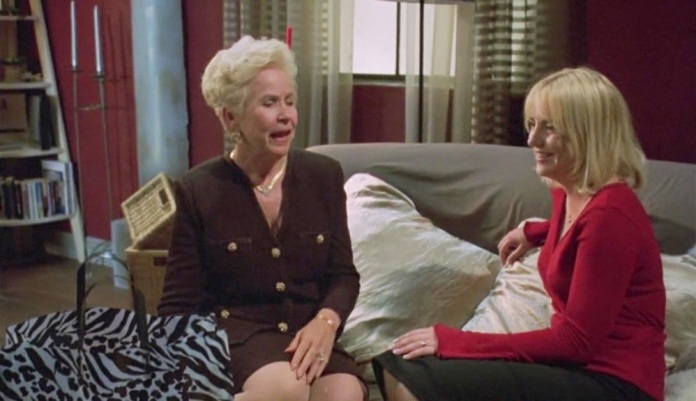
Several scenes depict Claudette lecturing Lisa on what she owes Johnny and how Lisa can’t support herself and therefore needs to tether herself to his financial security, scenes that reveal Wiseau’s understanding of gender relations to be jammed somewhere back in 1917. Lisa’s ultimate crime of not comprehending Johnny’s greatness is therefore a compulsive act of self-destructiveness. By the time Johnny finally shoots himself after a titanic bout of maudlin demolition, it becomes clear that the film he’s made is a version of a child’s pouting session where he fantasises how much people will regret hurting him once he’s dead. The internal dynamics of Wiseau’s scenes often defy description, like the one in which Mark and Peter come to blows, or the already-immortal scene in which Lisa’s distanced provocation drives Johnny to scream, “You’re tearing me apart, Lisa!” The characters move on from these concussive, sometimes near-deadly altercations almost immediately, without repercussions. Only one scene obtains anything like a whiff of authenticity, when Johnny recounts how he met Lisa just after his arrival in San Francisco.

Fortunately, Wiseau had the perfect lead actor to focus the qualities of his writing and direction. Wiseau’s acting is bad enough to warp the fabric of time and space, his complete lack of charisma only compounding his seeming insensibility in many scenes, refusing to look actors he’s exchanging lines with in the eye and mumbling so thickly that he’s had to redub his lines throughout, lip movements rarely synched to what he’s saying. He expresses emotion through violent exclamations, and theatrical groans and grunts only add to his accent in creating a likeness to a stoned Arnold Schwarzenegger with delusions of thespian capacity. Then there’s the spectacle of some of the other actors obviously trying to work out how to deliver the insipid drivel they’ve been given to speak. Wiseau’s inspired awfulness reaching an apogee in his moan-and-groan final scenes, trashing his house and shooting himself in a bratty fit, leaving Lisa and Mark to weep over his body and Mark to finally realise what a bitch Lisa is and walk out. Perhaps Lisa goes on to find her metier as a weapon of mass destruction for some obscure dictator.
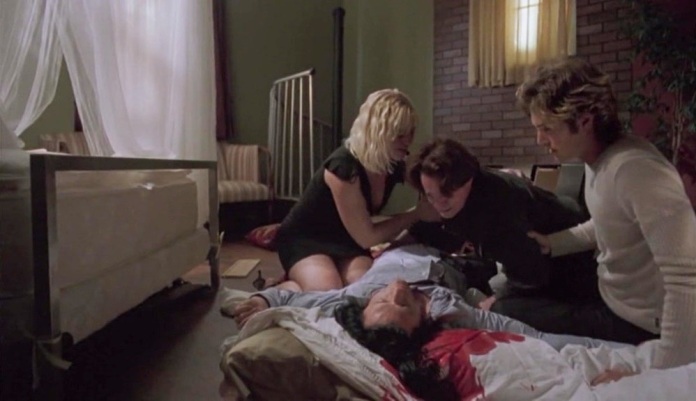
Either way, the ultimate statement of Wiseau’s movie is that it sucks to be him, and it’s one whose manifold inanities I feel like I’ve only touched on. The effect of The Room is powerful, in a strange sort of way, as it lives up to the grand tradition of Bad Movies, and seems to infect everything else after it to make you feel both elated and wearied. It’s perhaps the first time I’ve ever been left feeling personally insulted by a filmmaker. The Room finishes, and yet its all-pervading awfulness remained with me. Everything seemed to grow darker, tainted by its touch. The likes of Michelangelo and Leo Tolstoy would have had their faith in creative endeavour shaken by it, and afterwards I started seeing the inner Wiseau in many a great artist, as if all efforts lead into an immense heart of crappiness.

Rod, I know what you mean about the “best” of Bad Movies. I was never more inspired to make movies myself than I was after watching Al Adamson’s Dracula vs. Frankenstein. While I still haven’t taken the challenge of The Room, the cult around it has intrigued me because, as far as I know, it’s the first Worst Film candidate not grounded in recognizable genre — unless you count Showgirls. My own belief is that the true Worst Film must be an attempted comedy, since you should not be able even to laugh at it, but from your account The Room may meet that all-important criterion. Someday I’ll see for myself.
LikeLike
Sam – Attempts at making parody bad movies, like The Lost Skeleton of Cadavra don’t really work because they are trying to be funny. What makes a bad movie compelling is that it takes itself seriously. I try to avoid seeing bad films, but when I was young, I took them in as the simple-minded efforts they wear, made for people who weren’t yet engaged in intellectual pursuits. My favorite of these films, reviewed on this site, is The Giant of Marathon, because the simple tales of Greek mythology and history and cool special effects (for those times), are tailormade for youngsters who are inexperienced.
As for Showgirls, it is part of the recognizable genre of the veteran vs. upstart, and the subgenre of back stage show business. I think it’s a terrific film.
LikeLike
This is a fantastic (and very funny) look at what makes The Room such a uniquely sincere, all-consumingly bad movie. In all its bizarre, incompetent idiosyncrasies – from the repeated scenes and malapropisms to the faulty story logic and pointless plot twists (like “There is no baby!”) – it’s just as personal as it is bad, as if the film had emerged fully formed from Wiseau’s head, à la Athena and Zeus.
As you point, much of the film is a vehicle for Wiseau’s self-aggrandization, and (although I’ve watched it 3-4 times with much mirth) this leaves a bad taste in my mouth. At least Wood’s films are, dare I say, well-intentioned, whereas The Room is filled with clumsy venom toward Lisa and women in general. This mean-spirited quality might make the whole experience unpalatable if the whole production didn’t also feel so deeply naive (an impression reinforced by Wiseau’s shaky grip on conversational English, both as writer and actor); as it is, it’s fairly easy to enjoy because despite his rancor and narcissism, Wiseau feels like he doesn’t know what misogyny is, and is just spewing his bizarre worldview straight out onto the screen.
As for genre, the initial advertising campaign described The Room as a torrid drama “with all the passion of Tennessee Williams”; when it became a cult hit, the official line switched to “black comedy.” So I guess it’s intended to be somewhere in the dramatic vicinity of a San Francisco-set Cat on a Hot Tin Roof? (With the occasional reference to Rebel Without a Cause or Citizen Kane.) The results, of course, suggest instead that it’s set on another planet, or in another dimension.
For more information, I recommend the AV Club interview with Wiseau, who reveals a little more than he probably means to:
http://www.avclub.com/articles/tommy-wiseau,29598/
LikeLike
Marilyn: Just to clarify, I didn’t mean that the theoretical Worst Film must be a comedy attempting self-consciously to be the Worst — and I actually find Lost Skeleton and Larry Blamire’s other films pretty funny. My reasoning is that since the redeeming quality of a Bad Film is usually its ability to provoke laughter and thus still entertain a knowing audience, the comedy that fails most completely to draw laughter must be the worst of all films, the sort of thing people probably imagine Jerry Lewis’s The Day the Clown Cried to have been. On the other hand, since many people judge a film’s Badness by their own laughter, I could be all wrong. By my criterion, anyway, Showgirls is far too much fun to be the Worst Film.
LikeLike
Sam – I enjoyed Lost Skeleton but found more than a little of its humor kind of forced. That’s what’s so great about a so bad it’s good movie – it doesn’t know it’s funny.
For me, the worst film I’ve ever seen all the way through (I’ve turned off a bunch of stinkers before too long) is Peter’s Friends because of the terrible, terrible script that wasted the talents of its A-list cast. That isn’t just a bad film – it’s a criminal film.
I might have to resurrect my defense of Showgirls.
LikeLike
The Room is a movie so empty, so wooden, and so uninspired that I almost feel like it’s not a movie worthy of a review this fantastic and this well-deserved–and I mean that as a huge compliment, Rod. Tommy Wiseau is an anti-filmmaker of the lowest order: he lacks dreams and imagination, not to mention ambitions. I borrowed the movie from a friend once and was appalled to actually see Wiseau in the DVD introduction encouraging his fans to vote for the movie on the Internet Movie Database. The day when filmmakers actually start caring about their own IMDB votes is the day when I’ll know that the medium is dead.
I say all this with the realization that, in fairness, there are scenes from The Room that I can’t help but quote from time to time. There are funny lines in the movie, like Wiseau’s “I did not hit her!” tirade, but I’m not proud of finding them funny: the humorous lines in the movie are humorous for all the wrong reasons; and what the audience is laughing at, essentially, is Wiseau’s most-pathetic attempt to create some kind of personal story out of his own idiocies. I can believe it’s actually possible for the average filmmaker to make this kind of movie on a $5 million budget and get away with it! Oh, wait, it isn’t–Wiseau was involved in black marketeering with Korea or something, and raised all that money with the support of ruthless business tactics. What a way for him to set an example for younger, up-and-coming filmmaker who actually like making movies.
I couldn’t agree with you more that this movie, overall, gave me one of the most depressing and insulting experiences I’ve ever had watching a film. I bet Tommy Wiseau has no knowledge of classic movies and is yet another one of those directors who sees independent cinema as a means for sheer commerce. The fact that he has even launched attacks on his own CRITICS (he threatened to sue Doug Walker, aka The Nostalgia Critic, for reviewing the movie) only confirms his complete lack of respect for moviegoers who prefer to judge his movies objectively–for people who think his goals as a filmmaker ought to come into question. If audiences were not allowed to speak freely about movies, what would movies be? I know it’s a cliche to call somebody a totalitarian, but that is exactly what Wiseau is: he’s mean and he’s unfair, and you can sense this unpleasant persona lurking underneath ever single “laugh” moment in The Room.
With all of this being said, I don’t want to knock anybody who admires the film. Andreas has made some valid points here in the comments section, and the funniest and most enjoyable defense of the movie I’ve ever read is the review by Jake Cole that was published over at Not Just Movies back in April 2010. But when I then have to face the fact that Tommy Wiseau hasn’t even bothered to make another full-length feature film since then–when I have to face the fact that he’s probably going to spend the rest of his life coasting on the success of a film that was made famous by fans who are undoubtedly working harder than he is–I can’t think fondly of The Room. Especially when I have to consider that if Wiseau were reading these inflammatory comments of mine right now (or your amazing review here, Rod), he’d probably be tempted to have another “Cease and Desist” sent out in the name of everything which makes him the miserable person that he is.
LikeLike
Which is worse, a guy who, by all measurements, may not know better than to make a movie this bad, or a guy who, by all measurements, DOES know better and still makes the OTHER Bad Movie of our time, The Happening? Wiseau gets a shake of my head. Shyamalan gets a cup of warm bile.
LikeLike
Ah, I love waking up in the morning to a landscape sparkling with a fresh-fallen blanket of comments.
Samuel: considering the number of comedies out there that don’t make me laugh at all, that would be a more crowded field than dramas that make me laugh my ass off. What got me particularly interested in seeing The Room was a) its status as a genuine revival of the midnight movie cult movie, with repeat movie-going crowds who had made it a ritualistic affair, and b) because, as you mention, it’s not a “genre” film, but an attempted drama, and because it’s the Gethsemane of the independent film model. Industrial cinema can offer up its own horrors, of which the unfunny comedy is one of the most common, but The Room is all too barbed a piece of evidence that sometimes individual passion and artisan determination can also construct new dimensions of lousiness. Clichés are so often offered up about the artistic process as involving channelling pain into creativity and experience into aesthetic alchemy (a la Black Swan), that it’s always fascinating to me to see those clichés acted upon without any mediating discipline whatsoever.
One aspect of The Room that certainly fulfils your criteria, however, is the fact that whilst I laughed heartily and hurtfully at many of the serious bits and especially the sex scenes, the sequences that are obviously supposed to be “funny”, like Denny’s incursion into Johnny and Lisa’s pillow fight, Mike and Michelle’s chocolate-and-spit-swapping sessions and their being cleared out by Claudette and Lisa, and when Peter gets knocked over during their football game in tuxes, are only amusing in their complete lack of effect as comedy. So yes, the magical mean might have been reached by this: undramatic drama, unfunny comedy.
Mare: I don’t, by the way, think Showgirls is a bad film either, but it’s hard to deny that it did gather a large cult that worshipped it as a bad film. I’ll admit however to being a bit bewildered by your mention of The Giant of Marathon. I thought you liked that, and doesn’t it possibly come into the context I discussed of cheap movies that only seem bad because they were so cheap and quickly made?
Andreas: I can at least take “There is no baby!” as an extension of Lisa’s compulsive lying; if Wiseau had any talent he might have made the subject of a self-destructive romantic partner of some interest. I’ve known some people who pull apart their relationships because of a vague dissatisfaction that manifests in shoddy communication. But, of course, Wiseau has no talent, and he does seem to think that, as he lets slip in that interview he seems to think women are all in a conspiracy. We can be thankful of Wiseau’s naiveté, at any rate, because that does leaven the bad taste of his self-worshiping, women-hating bent.
Nice job on that link, BTW; I think I read that when it first appeared, but I deliberately avoided reading up on Wiseau for the sake of this piece, because I felt it might get in the road of my reaction to the film; if I had known Wiseau had such a shady past as Adam mentions, I might have been even nastier.
But I have to disagree with you, Adam, in that I think Wiseau has seen some classic movies, because, as Andreas points out, there are references to ‘50s melodramas, Williams and Ray and Hitchcock, at several points. But I don’t think he has any grasp of the context of those dramas, and even more to the point, he’s obviously a bit of a sponge, because as I’ve noted there’s a constant mishmash of influences that he obviously has an adolescent inability to discern the tonal and cultural disparities of what he’s playing with. His inelegant hijacking of such cultural touchstones and interspersing them with a direct-to-video eroticist’s idea of high style betrays the most absurd of mindsets. Also, I don’t entirely think Wiseau wanted to get into film just for the sake of commerce, although of course the siren call of cinema has always attracted opportunists and narcissists who shout “Me too!” and that Wiseau is undoubtedly both. But I do think he was also trying to express something within himself. Pure mercenaries are usually conservative and generic in their choice of material, and The Room, at least, isn’t that. What makes the product here so amazing and disturbing is that it seems both personal and mercenary, trying to fit the core story of angry sexual pain into a raft of soap opera tropes, and how Wiseau so obviously filches plot gambits and storytelling devices from a multiplicity of sources without any idea how to fit them together. His bullying antics aren’t so individual, either; after all, Uwe Boll has infamously attempted a similar you-me-outside-bud approach to critics. Still, we would all get a good laugh if he tried it here.
As you say, there is, or ought to be, a certain lack of pride in laughing Wiseau’s incompetence. I felt it myself more than a few times, and that’s largely why I found the experience depressing, and one of the reasons why I’ve become much less of a bad movie aficionado in recent years. Part of it is personal empathy; as a would-be creative person, I feel a certain moral compunction about watching other would-be creative people strive to make something and see it flail horribly. But that’s balanced by the obvious fact that Wiseau and many of his collaborators have put in no effort whatsoever in achieving the discipline expected of artists, so that leavens my guilt somewhat.
And to get into what Robert brings up: the politics of what gets called a bad movie are indeed a fascinating thicket that I didn’t want to get too tangled up in when writing this review, although I’ve touched on them. As I haven’t seen The Happening I can’t comment, but there is of course the argument that to condemn films as cheap as Ed Wood’s whilst giving passes to Hollywood drivel like Top Gun and Pretty Woman which have not even the faintest passing resemblance to the real world, is both unfair and even, in its way, to be something of a commercial tool. There can be contradictions in such exercises, however; whilst I never cease to enjoy the writing in Harry Medved and Randy Dreyfuss’s Fifty Worst Movies of All Time, there’s the odd fact that in their attempt to be democratic and encompass movies of all different stripes of budget and ambition, there several films I think are great in the book, and the aforementioned case of Showgirls is another excellent example. I would argue, however, that considering the amount of money supposedly expended on Wiseau’s film, it’s elevated beyond the range where certain breaks can be offered – after all, most Australian filmmakers would think all their Christmases had come at once if they were give a $6 million budget.
LikeLike
Rod – I can recognize the laughable elements of The Giant of Marathon, which were skewered by The Film Crew in 2007, while recognizing my genuine affection for it based on my own personal history with sword and sandal films growing up and on the genuinely great action sequence directed by Mario Bava. I don’t know what it’s budget was, but I don’t think it was great, being one of many in the Italian historical film factory of the late 50s and early 60s. And, of course, you’re right about Showgirls, another film that is easy to riff on, particularly if you’re a drag queen.
LikeLike
Well, there’s part of my point: if The Giant of Marathon has a great battle scene by Mario Bava, then it’s not a bad movie, even if it has laughable moments. Then again, I’m so used to the wild dips and rises in quality in Euro genre cinema that I practically see through such interludes these days.
LikeLike
If the film gets a Mystery Science Theatre treatment, which is what The Film Crew morphed from, then it’s a bad movie.
LikeLike
There’s a lot of people whom that definition infuriates, although it is a pervasive one.
LikeLike
Oh, I agree. I was actually a little offended to learn that The Film Crew took it on, but I had to be a little more objective about it. TFC actually found they couldn’t snark off on the Bava sequence, except for the “diaper” the warriors wore.
LikeLike